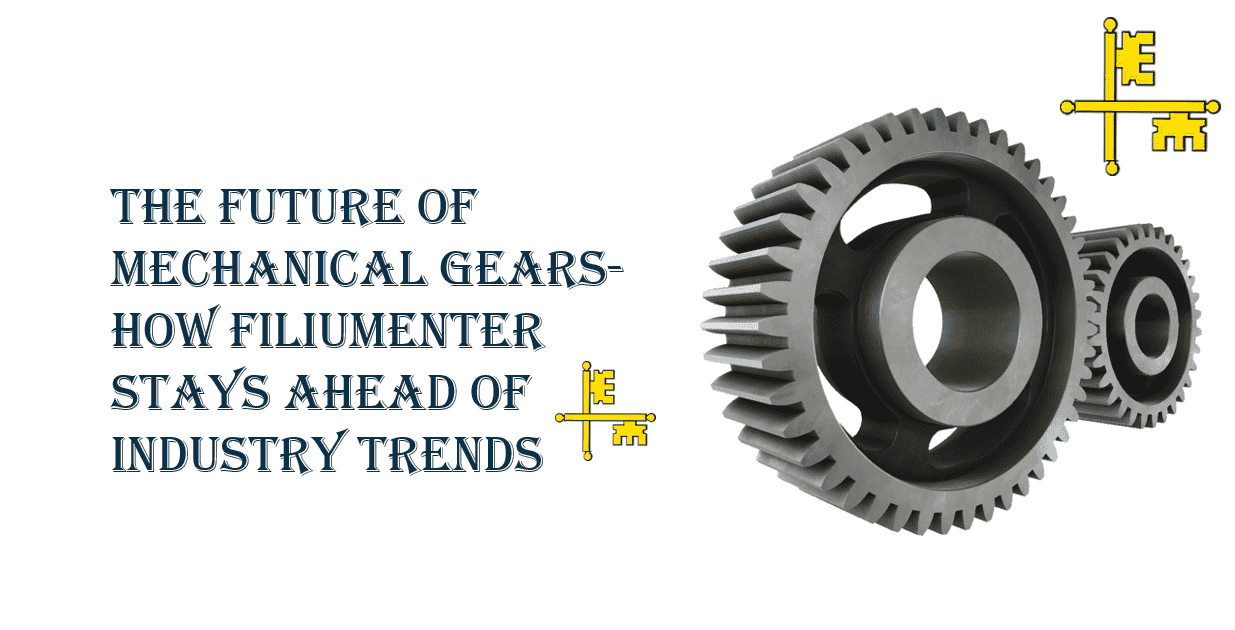Understanding the Difference Between Stock Gears and Custom Gears

Understanding the Difference Between Stock Gears and Custom Gears
When it comes to mechanical systems, gears play a crucial role in transmitting power and ensuring the smooth functioning of machines. Whether you're working on an automotive engine, a manufacturing system, or an industrial application, selecting the right type of gear is paramount. Two common options are stock gears and custom gears. While both serve the same fundamental purpose, understanding the differences between them can significantly impact the performance, cost, and longevity of your mechanical system. In this article, we will explore the differences between stock gears vs custom gears, and why choosing the right one matters for your specific needs.
Table of Contents
- Introduction
- What Are Stock Gears?
- What Are Custom Gears?
- Stock Gears vs Custom Gears: Key Differences
- When to Choose Stock Gears vs Custom Gears
- Filium Enterprises Gears: A Leading Choice for Quality Gears
- Conclusion
What Are Stock Gears?
Stock gears are standard, mass-produced gears that are readily available from manufacturers and suppliers. These gears are designed to meet general specifications, such as pitch, size, material, and other common parameters. Stock gears come in various forms, including spur gears, helical gears, bevel gears, and worm gears, among others. They are produced in large quantities and stocked for immediate delivery, making them ideal for businesses or individuals needing gears for standard applications or quick replacements.
Advantages of Stock Gears:
- Cost-Effective: Since stock gears are mass-produced, they are typically less expensive than custom gears. The economies of scale drive down the cost, making them an affordable option for many.
- Quick Availability: Stock gears are readily available in the market and can be delivered quickly, which makes them perfect for time-sensitive projects or emergency repairs.
- Proven Designs: Stock gears are designed and tested for common applications, ensuring they meet general performance standards and reliability.
However, there are limitations to using stock gears. For instance, stock gears may not always match the exact specifications required for highly specialized applications. If the system requires specific sizes, materials, or gear ratios that fall outside the standard range, stock gears may not be suitable.
What Are Custom Gears?
Custom gears, on the other hand, are tailored specifically to meet the unique requirements of a particular application. These gears are designed, manufactured, and tested to fulfill precise specifications, whether for a niche industry, a complex machine, or a highly specialized purpose. Custom gears can be designed in any size, shape, or material, ensuring a perfect fit for the needs of the application.
Advantages of Custom Gears:
- Tailored to Specific Needs: The primary benefit of custom gears is that they can be designed to fit the exact specifications of a machine or application. Whether you need a particular tooth shape, size, or material, custom gears can be engineered to meet these precise needs.
- Optimized Performance: Custom gears can be designed for efficiency, reliability, and durability. In industries such as aerospace, automotive, or manufacturing, where performance is critical, custom gears help ensure that the gear system operates optimally under specific conditions.
- Long-Term Cost Savings: While custom gears may have a higher upfront cost than stock gears, they often result in longer lifespans, reduced maintenance costs, and fewer breakdowns, making them a worthwhile investment for specialized systems.
Despite these advantages, custom gears can be significantly more expensive and time-consuming to produce. They often require more detailed design work, advanced manufacturing processes, and longer lead times.
Stock Gears vs Custom Gears: Key Differences
-
Cost:
- Stock Gears: Generally more affordable because they are mass-produced.
- Custom Gears: Higher initial cost due to design, material selection, and manufacturing complexity.
-
Availability:
- Stock Gears: Available off-the-shelf and can be shipped quickly.
- Custom Gears: Requires time to design, prototype, and manufacture, resulting in longer lead times.
-
Design Flexibility:
- Stock Gears: Limited in design options, as they must adhere to standard specifications.
- Custom Gears: Completely customizable to meet specific requirements, such as material, size, gear ratio, and precision.
-
Performance:
- Stock Gears: Suitable for general applications but may not perform as efficiently or last as long in highly specialized systems.
- Custom Gears: Engineered for superior performance in demanding or specialized applications, offering better reliability and durability.
-
Maintenance:
- Stock Gears: While typically reliable, stock gears may require more frequent replacement or maintenance if not a perfect match for the system.
- Custom Gears: Often result in fewer maintenance issues, as they are designed to be a perfect fit for the specific application.
When to Choose Stock Gears vs Custom Gears
The decision to choose stock gears vs custom gears largely depends on the application and its requirements. For general-purpose machinery, where speed and cost are more critical than precision, stock gears are often the best option. They are widely available, cost-effective, and can be used in a variety of industries, from automotive to general manufacturing.
However, if your system has specific requirements, such as unique sizes, materials, or performance criteria, then custom gears may be the better choice. For example, in high-performance or precision-driven sectors like aerospace, robotics, or medical devices, custom gears ensure that the system operates at its highest capacity and efficiency.
Filium Enterprises Gears: A Leading Choice for Quality Gears
When it comes to both stock and custom gears, Filium Enterprises gears stand out as a reputable option for businesses looking for high-quality, reliable, and durable gears. Whether you are in need of stock gears for standard applications or require custom gears for specialized projects, Filium Enterprises offers a comprehensive range of products designed to meet the most stringent specifications.
With a commitment to excellence, Filium Enterprises provides customized gear solutions tailored to the specific needs of clients across various industries. Their state-of-the-art manufacturing processes ensure the highest standards of quality, performance, and longevity for both stock and custom gears.
Conclusion
In summary, the decision between stock vs custom gears depends on your specific application, performance needs, and budget. Stock gears are perfect for general applications and cost-effective solutions, while custom gears offer tailored precision for more complex or specialized systems. For businesses looking for top-tier gear solutions, Filium Enterprises gears offer the flexibility and reliability needed for both stock and custom gear applications. By understanding your system's requirements and working with an experienced gear supplier, you can make the best choice for your project’s success.
Related Products
Here are some statistics and facts that can be used to support the points in the article on stock gears vs custom gears:
1. Global Gear Market Growth
- The global gear market is expected to reach $300 billion by 2026, growing at a 5.1% CAGR (Compound Annual Growth Rate) from 2021. This highlights the increasing demand for both stock and custom gears across various industries, including automotive, manufacturing, and robotics. (Source: MarketsandMarkets)
2. Stock Gears in Automotive Industry
- The automotive industry is one of the largest consumers of gears, with over 1 billion gears produced annually. A significant portion of these are stock gears, used for transmission systems, engines, and other vehicle components. (Source: Gear Technology)
3. Custom Gear Manufacturing for Aerospace
- In highly specialized industries like aerospace, custom gears are often used due to their specific requirements for size, material, and performance. Aerospace applications require gears that can withstand extreme temperatures and pressures, making custom gears essential for safety and reliability. (Source: Aerospace Manufacturing and Design)
4. Cost Comparison
- Stock gears are generally 30% to 50% cheaper than custom gears. The cost of manufacturing stock gears is reduced due to mass production and standardized design, while custom gears involve higher production costs because of design and material customization. (Source: Gear Solutions Magazine)
5. Efficiency of Custom Gears in Industrial Applications
- Custom gears can improve efficiency by up to 20% in systems where high precision is required. Industries like robotics and CNC machinery often rely on custom gears to meet specific speed, torque, and load requirements. (Source: Journal of Mechanical Engineering)
6. Gear Failure and Maintenance
- According to a report from FMEA (Failure Mode and Effects Analysis), improper gear selection or mismatch between gears can lead to failures that increase maintenance costs by up to 35%. Custom gears can help reduce these risks by providing a more precise fit for high-demand applications. (Source: American Gear Manufacturers Association)
7. Gear Design and Material Selection
- Gears are typically made from materials like steel (60%), cast iron (20%), and non-ferrous metals (10%), depending on the application's needs. Custom gears allow for the use of specialized materials, such as lightweight alloys for aerospace or heat-resistant alloys for high-performance automotive engines. (Source: Gear Solutions)








